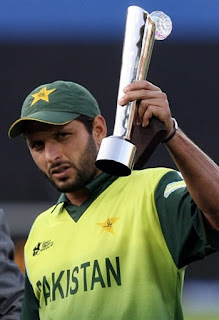PakAlumni Worldwide: The Global Social Network
The Global Social Network
T20 Cricket Wins----A Metaphor For Life in Pakistan

Cricket in Pakistan is more than a national obsession; it is a metaphor for life. Pakistani cricket is endowed with tremendous raw talent. But the national team captains have often failed in translating it into significant success in major international events. The last time Pakistan won the Cricket World Cup was in 1992. The T20 cricket has been marked by much improved quality of Pakistani leadership recently. After the seventh straight 2020 win against New Zealand today in Dubai, the energized Pakistani captain Shahid Afridi gave credit to the good teamwork among the T20 squad. Unlike Pakistan's rulers, Afridi is not a feudal prince. He has not inherited the cricket leadership position. He has earned it by working hard and by showing the ability to lead people to success.
Speaking from my own experience, I have seen some of the brightest and most successful individuals from Pakistan in Silicon Valley. They are top business executives, entrepreneurs, venture capitalists, researchers and professionals contributing to the success of Silicon Valley. Most came from Pakistan's middle class with good education but little or no money. They attended some of the best universities in America and joined some of the top companies before starting out on their own to become professionally and financially successful. Many have also demonstrated their leadership skills in an environment that promotes meritocracy.
Unfortunately, meritocracy in politics has never thrived in Pakistan, at least in part because landowning remains almost the only social base from which national leadership can emerge. In general, the educated middle class in Pakistan and the talented leaders from urban areas are largely excluded from competing for the top positions in government, and denied a chance to provide the badly needed leadership to achieve collective national success.
In spite of the current and past failures of national political leadership, I am optimistic about the future of Pakistan. With the robust economic growth averaging 7 percent and availability of millions of new jobs created between 2000 and 2008, there has been increased rural to urban migration in Pakistan to fill the jobs in growing manufacturing and service sectors. The level of urbanization in Pakistan is now the highest in South Asia, and its urban population is likely to equal its rural population by 2030, according to a report titled ‘Life in the City: Pakistan in Focus’, released by the United Nations Population Fund. Pakistan ranks 163 and India at 174 on a list of over 200 countries compiled by Nationmaster. The urban population now contributes about three quarters of Pakistan's gross domestic product and almost all of the government revenue. The industrial sector contributes over 27% of the GDP, higher than the 19% contributed by agriculture, with services accounting for the rest of the GDP.
With the shifting demographics over this decade and the next, the center of political power is expected to move from rural to urban Pakistan, opening up the opportunities for more competent national leaders to emerge from the educated urban middle class. Combining the considerable individual talent in Pakistan with improved leadership should pave the way for turning Pakistan's collective failure into collective national success.
Related Link:
Pakistan Crowned 2020 World Champions
Pakistani Entrepreneurs' Silicon Valley Summit
Urbanization in Pakistan Highest in Asia
Ode to Feudal Prince of Pakistan
Is Pakistan Too Big to Fail?
NEDUET Alumni in Silicon Valley
Tags:
Replies to This Discussion
Twitter Feed
Live Traffic Feed
Sponsored Links
South Asia Investor Review
Investor Information Blog
Haq's Musings
Riaz Haq's Current Affairs Blog
Please Bookmark This Page!
Blog Posts
Can Pakistan's JF-17 Become Developing World's Most Widely Deployed Fighter Jet?
Worldwide demand for the JF-17 fighter jet, jointly developed by Pakistan Aeronautical Complex (PAC) and China’s Chengdu Aircraft Industry Group (CAIG), is surging. It is attracting buyers in Africa, Asia and the Middle East. At just $40 million a piece, it is a combat-proven flying machine with no western political strings attached. It has enormous potential as the lowest-cost 4.5…
ContinuePosted by Riaz Haq on February 4, 2026 at 8:00pm — 1 Comment
EU-India Trade Deal: "Uncapped" Mass Migration of Indians?
The European Union (EU) and India have recently agreed to a trade deal which includes an MOU to allow “an uncapped mobility for Indian students”, according to officials, allowing Indians greater ease to travel, study and work across EU states. India's largest and most valuable export to the world is its people who last year sent $135 billion in remittances to their home country. Going by the numbers, the Indian economy is a tiny fraction of the European Union economy. Indians make up 17.8%…
ContinuePosted by Riaz Haq on January 28, 2026 at 11:00am — 10 Comments
© 2026 Created by Riaz Haq.
Powered by
![]()